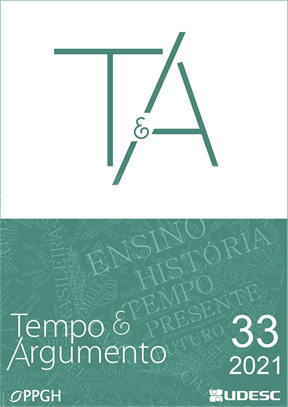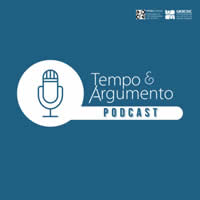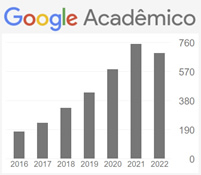Uma flor com História: ensinar o fim da ditadura em Portugal a partir de uma narrativa literária
DOI:
https://doi.org/10.5965/2175180313332021e0106Resumo
O ensino da História afirma-se, hoje, como um importante contributo para a formação integral das mais jovens gerações, como facilitador de uma mais consciente compreensão das realidades sociais e culturais contemporâneas, como potenciador de competências várias para a interpretação dos assuntos históricos e, por conseguinte, da participação democrática mais esclarecida. Por sua vez, a educação literária pode, se assim for entendido, proporcionar uma multiperspetivada e humana forma de analisar e compreender os fenómenos sociais, a história comum de todos os dias, os diferentes tempos e lugares. Dessa interação evidente entre áreas do saber diferentes percebe-se a possibilidade de se desenvolverem, com coerência, dinâmicas de articulação curricular. Nesse sentido, a presente investigação resulta de um estudo desenvolvido com crianças portuguesas do 6.º ano de escolaridade, que, em sala de aula, estudaram os conteúdos relacionados com a Revolução democrática do 25 de abril de 1974 a partir de uma obra literária infanto-juvenil – “História de uma Flor”, de Matilde Rosa Araújo. Os dados evidenciam as potencialidades formativas da dinâmica de articulação curricular concretizada, uma vez que as crianças foram capazes de fazer uma leitura individual, com significado, do texto literário selecionado e, através dela, apropriar-se de outros conhecimentos históricos além dos substantivos.
Palavras-chave: Educação Histórica; literatura; história; articulação curricular; Portugal.
Downloads
Referências
APRENDIZAGENS ESSENCIAIS. História e Geografia de Portugal: 6.º ano. Lisboa: Direção-Geral da Educação, 2018.
ARAÚJO, Matilde Rosa. História de uma flor. Lisboa: Caminho, 2008.
BARCA, Isabel. A controvérsia em história e em educação histórica. In: VERA, Juan; FERNANDÉZ, José (eds.). Temas controvertidos en la aula: enseñar historia en la era de la posverdad. Murcia: Universidad de Murcia, 2019a. p.497-511.
BARCA, Isabel. Investigar em educação histórica em Portugal: opções metodológicas. Educar em Revista, Curitiba, v. 35, n. 74, p. 109-126, 2019b. Disponível em https://revistas.ufpr.br/educar/article/view/64403/38487. Acesso em: 10 jan. 2021.
BARDIN, Laurence. Análise de conteúdo. São Paulo: Edições 70, 2011.
BARTON, Keith; LEVSTIK, Linda. Teaching history for the common good. Mahwah: Lawrence Erlbaum Associates, 2004.
BEANE, James A. Integração curricular: a essência de uma escola democrática. Currículo sem Fronteiras, [s.l.], v. 3, n. 2, p. 91-110, 2003. Disponível em: http://www.curriculosemfronteiras.org/vol3iss2articles/beane.pdf. Acesso em: 16 jan. 2021.
BILLIG, Michael. Nacionalismo banal. Madrid: Capitán Swing, 2014.
CHAPMAN, Arthur. Historical interpretations. In: DAVIES, Ian (ed.). Debates in history teaching. Abingdon: Routledge, 2010. p.96-108.
CHAPMAN, Arthur. Introduction: historical knowing and the ‘knowledge turn’. In: CHAPMAN, Arthur (ed.). Knowing history in schools. London: UCL Press, 2021. p.1-31.
CHAPMAN, Arthur; GEORGIOU, Maria. Powerful knowledge building and conceptual change research: learning from research on ‘historical accounts’ in England and Cyprus. In: CHAPMAN, Arthur (ed.). Knowing history in schools. London: UCL Press, 2021. p.72-96.
CONSELHO DA EUROPA. Ensino de qualidade na disciplina de História no século XXI. Estrasburgo: Conselho da Europa, 2018.
COUNSELL, Christine; MCCONNELL, Tony; BURN, Katharine; FOSTER, Rachel. Editorial. Teaching History, London, n. 171, p. 2, 2018.
DAMÁSIO, António. A estranha ordem das coisas. Lisboa: Temas e Debates - Círculo de Leitores, 2017.
FLICK, Uwe. El diseño de la investigación cualitativa. Madrid: Morata, 2015.
LEE, Peter. Literacia histórica e história transformativa. Educar em Revista, Curitiba, n. 60, p. 107-146, 2016. Disponível em: https://www.scielo.br/j/er/a/kGFY5FDVCVz6J8DJCKwbqcT/?lang=pt. Acesso em: 3 jan. 2021.
LEITE, Carlinda. A articulação curricular como sentido orientador dos projetos curriculares. Educação Unisinos, São Leopoldo, v. 16, n. 1, p. 87-92, 2012. Disponível em: http://www.revistas.unisinos.br/index.php/educacao/article/view/edu.2012.161.09/773. Acesso em: 16 jan. 2021.
MÃE, Valter Hugo. Países de crianças. Notícias Magazine, Porto, 11 jan. 2021. Disponível em: https://www.noticiasmagazine.pt/2021/paises-de-criancas/cronicas/cidadania-impura/258627/. Acesso em: 11 jan. 2021.
MANGUEL, Alberto. Uma história da leitura. Lisboa: Editorial Presença, 1998.
MANSFIELD, Andrew. Confusion, contradiction and exclusion: the promotion of British values in the teaching of history in schools. The Curriculum Journal, London, v. 30, n. 1, p. 40-50, 2019.
MARTINS, Guilherme Oliveira et al. Perfil dos alunos à saída da escolaridade obrigatória. Lisboa: Direção-Geral da Educação, 2017.
MORGADO, José Carlos; SILVA, Carlos. Articulação curricular e inovação educativa: caminhos para a flexibilidade e a autonomia. In: MORGADO, José; VIANA, Isabel; PACHECO, José (orgs.). Currículo, inovação e flexibilização. Santo Tirso: De Facto, 2019. p. 59-76.
NORDGREN, Kenneth. How to do things with history: use of history as a link between historical consciousness and historical culture. Theory & Research in Social Education, London, v. 44, n. 4, p. 479-504, 2016.
NORDGREN, Kenneth. Powerful knowledge, intercultural learning and history education. Journal of Curriculum Studies, London, v. 49, n. 5, p. 663-682, 2017.
PORTUGAL. Decreto-Lei n.º 55/2018, de 6 de julho de 2018. Diário da República, [Lisboa], Série I, 129, 6 jul. 2018. Disponível em: https://www.dge.mec.pt. Acesso em: 1 fev. 2021.
ROLDÃO, Maria do Céu; ALMEIDA, Sílvia. Gestão curricular: para a autonomia das escolas e professores. Lisboa: Direção-Geral da Educação, 2018.
ROSALES LÓPEZ, Carlos. Didáctica: innovación en la enseñanza. Santiago de Compostela: Andavira, 2009.
RÜSEN, Jörn. Jörn Rüsen e o ensino da história. Brasil: Editora UFPR, 2010.
RÜSEN, Jörn. History in context: critical approaches to some basic concepts. In: VERA, Juan; FERNANDÉZ, José (eds.). Temas controvertidos en la aula: enseñar historia en la era de la posverdad. Murcia: Universidad de Murcia, 2019. p. 425-440.
SCHMIDT, Auxiliadora; URBAN, Ana Cáudia. Afinal, o que é educação histórica? Revista Ibero-Americana de Educação Histórica, Curitiba, v. 1, n. 1, p. 7-31, 2018. Disponível em: https://aipedh.files.wordpress.com/2019/07/ribeh_v.1_n.1.pdf. Acesso em: 3 jan. 2021.
SEIXAS, Peter; MORTON, Tom. The big six historical thinking concepts. Toronto: Nelson, 2013.
SILVA, Vítor Aguiar e. Teoria da literatura. Coimbra: Livraria Almedina, 1981.
SMITH, Joe; JACKSON, Darius. Two concepts of power: knowledge (re)production in english history education discourse. In: CHAPMAN, Arthur (ed.). Knowing history in schools. London: UCL Press, 2021. p.152-176.
TORRES SANTOMÉ, Jurjo. Sin muros en las aulas: el currículum integrado. In: GIMENO SACRISTÁN, José (org.). Ensayos sobre el currículum: teoría y práctica. Madrid: Morata, 2015. p. 148-159.
WINEBURG, Sam. Historical thinking and other unnatural acts. Philadelphia: Temple University Press, 2001.
YIN, Robert. Case study research and applications: design and methods. 6. ed. Los Angeles: SAGE, 2018.
ZILBERMAN, Regina. A literatura infantil na escola. 7. ed. São Paulo: Global Editora, 1987.
Downloads
Publicado
Como Citar
Edição
Seção
Licença
Copyright (c) 2021 Revista Tempo e Argumento

Este trabalho está licenciado sob uma licença Creative Commons Attribution-NonCommercial 4.0 International License.
Os artigos cujos autores são identificados representam a expressão do ponto de vista de seus autores e não a posição oficial da Tempo e Argumento.





